The head coach is responsible for overall team strategy, decision-making, and leadership, setting the direction and tone for the entire sports team. In contrast, the assistant coach supports the head coach by focusing on specific areas such as player development, training exercises, and providing individual feedback. Together, they create a cohesive coaching environment that enhances team performance and success.
Table of Comparison
| Role | Head Coach | Assistant Coach |
|---|---|---|
| Primary Responsibility | Overall team strategy and leadership | Support and specialized training |
| Decision Making | Main decision-maker during games | Advises head coach, assists in decisions |
| Player Development | Focuses on team cohesion and performance | Works individually with players on skills |
| Game Preparation | Plans tactics and game strategy | Prepares drills and exercises |
| Communication | Leads communication with media and management | Focuses on internal team communication |
| Authority | Highest coaching authority | Operates under head coach direction |
| Example Roles | Team leader, strategist | Skills coach, fitness coach, position coach |
Key Differences Between Head Coach and Assistant Coach Roles
The head coach holds primary responsibility for overall team strategy, decision-making, and leadership during games, shaping the team's performance and culture. Assistant coaches focus on specialized areas such as player development, training drills, and tactical support, providing detailed guidance to individual athletes or units. The key difference lies in authority and scope, with the head coach overseeing the entire program while assistant coaches execute specific tasks to enhance team effectiveness.
Responsibilities of a Head Coach in Sports Teams
The head coach holds primary responsibility for devising team strategies, overseeing player development, and making critical game-time decisions that influence match outcomes. Tasked with setting training regimens, managing coaching staff, and fostering team cohesion, the head coach ensures the squad operates efficiently and competitively. Leadership, tactical expertise, and communication skills are essential for a head coach to drive a sports team towards championship success.
Core Duties of an Assistant Coach
The core duties of an assistant coach include developing training programs, analyzing player performance, and providing individualized skill improvement plans. They support the head coach by managing practice sessions, offering tactical advice, and facilitating communication between players and staff. Assistant coaches also play a vital role in scouting opponents and helping to implement game strategies.
Leadership Styles: Head Coach vs Assistant Coach
Head coaches typically employ authoritative leadership styles, setting the overall vision and making strategic decisions to guide the team toward long-term success. Assistant coaches often use supportive and collaborative leadership approaches, focusing on player development, skill improvement, and providing personalized feedback. The dynamic between head and assistant coaches creates a balanced leadership structure that enhances team performance and cohesion.
Decision-Making Authority: Who Leads the Team?
The head coach holds primary decision-making authority, setting strategies, game plans, and lineups that guide the entire team's performance. The assistant coach supports these decisions by executing training drills, analyzing player performance, and offering tactical advice tailored to specific positions or situations. This hierarchical structure ensures clear leadership, with the head coach ultimately responsible for final decisions that affect team success.
Collaboration and Communication: Head Coach & Assistant Coach Dynamics
Effective collaboration between a head coach and assistant coach drives team success by ensuring clear communication of strategies and player development plans. The head coach sets the overall vision and game plan, while the assistant coach provides specialized insights and supports individual athlete growth, creating a dynamic balance. Consistent dialogue and mutual trust foster a unified coaching approach that enhances performance and adaptability during competitions.
Career Path: Moving from Assistant Coach to Head Coach
Gaining experience as an assistant coach is crucial for developing tactical knowledge, leadership skills, and team management abilities essential for a head coach role. Successful assistant coaches often enhance their reputation by contributing to winning strategies and player development, making them prime candidates for head coaching positions. Career advancement typically involves networking within the sports community, continuous learning, and demonstrating the capacity to lead at higher competition levels.
Head Coach and Assistant Coach Impact on Team Performance
The head coach holds primary responsibility for overall team strategy, game planning, and decision-making, directly influencing team performance and player development. Assistant coaches provide specialized expertise, support training sessions, and focus on individual player skills to enhance the team's competitive edge. Effective collaboration between head coach and assistant coaches is crucial for achieving optimal game results and maintaining consistent team progress.
Training and Development Strategies: Main Coach vs Support Coach
The head coach designs comprehensive training programs emphasizing overall team strategy, skill development, and performance metrics to achieve competitive success. The assistant coach implements these plans through individualized drills, provides targeted feedback, and facilitates player improvement by addressing specific technical and tactical needs. Collaboration between both roles ensures adaptive training methods that optimize athlete development and team cohesion.
Challenges Faced by Head Coaches and Assistant Coaches
Head coaches manage overall team strategy, media relations, and high-pressure decision-making, often facing intense scrutiny for performance outcomes. Assistant coaches handle specialized training, player development, and maintaining team cohesion, balancing support with autonomy under the head coach's guidance. Both roles require adaptability, communication skills, and resilience to navigate the complexities of competitive sports environments.
head coach vs assistant coach Infographic

 difterm.com
difterm.com